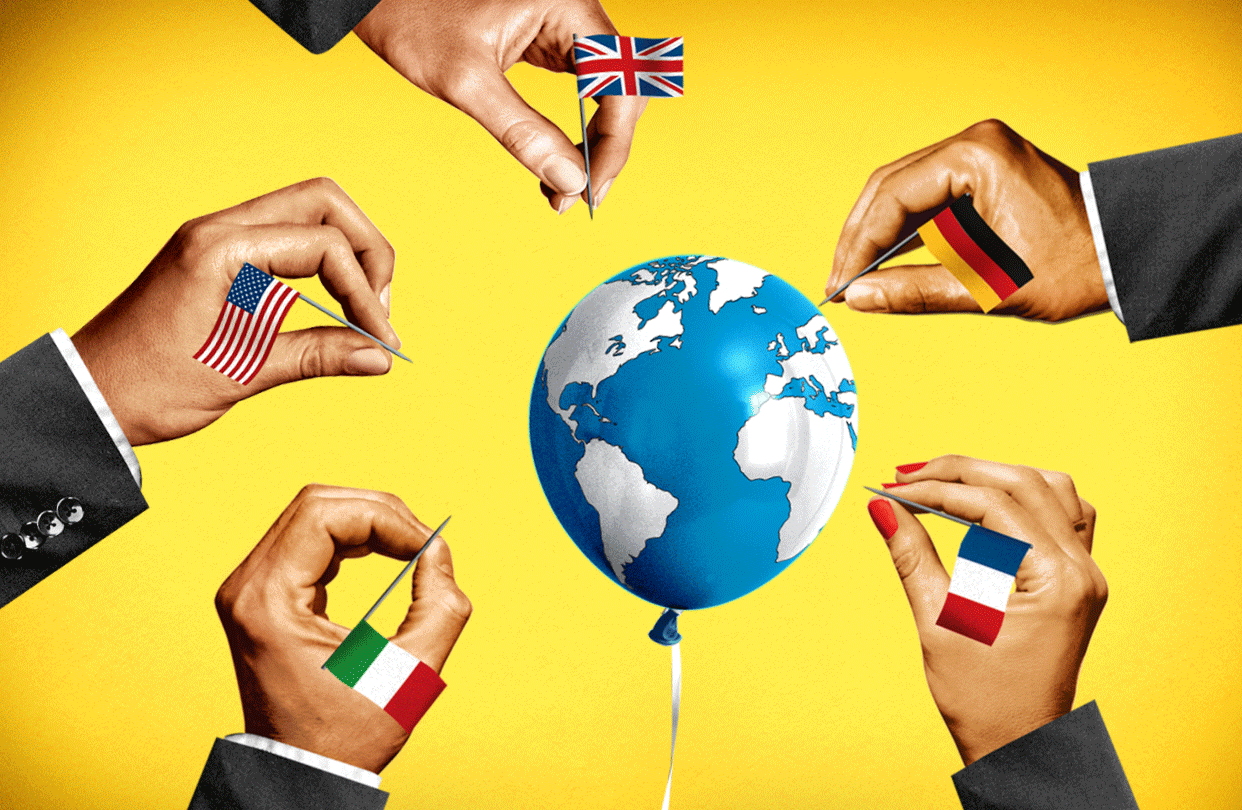Has the rise in nationalism impacted globalisation? – Ayoola O
When I look at Politics, it is very hard to look at national news stories in isolation. Nowadays the word ‘International Relations’ has become even more prevalent in our societies today where all events are played out on a global stage. In times of recent national conflicts and humanitarian crises, buzz words such as global cooperation, interdependence and mutuality all spring to mind. Also the divide between the Global North and the Global South, some would argue, has become less divided to a certain extent by maybe evidence of multiculturalism that is continuing to diversify itself in Western countries today or when there that be Argentina who has newspaper articles and radio and television programmes presented in English, German, Italian, French, Portuguese as well as the country’s own native Spanish. This is predominantly due to the idea of globalisation which almost presents our world as a global village, where all our problems can be solved together, “we are better together!” All nations need to unite to solve the issues of climate change, “Civil Wars aren’t a YOU problem they are an US problem. But that doesn’t mean nationalism has died. In this article, I will expand on this further with examples such as Marine Le Pen coming second in the French elections, the rise in Trumpism in America and his America fist campaign and xenophobia in South Africa as well as the implications of global issues such as climate change.
Firstly, nationalism is the policy of asserting the interest of one’s own nation, viewing it as separate from the interest of other nations. It is nit to be confused with patriotism which has a slight,y different meaning. It means national love and being proud of your country.
Globalisation is the interconnected news, interaction and integration among people, companies, governments and capital across different nations and cultures.
Globalisation represents one of the most profound changes to the evolution of International Relations over the past century. As a phenomenon which was merely used by economists to describe the global market and economy, it has now taken on a new form to encompass culture, power, identity, security, religion and so much more,
These are important triumphs. However it would be narrow-minded of me ro say that our current globalisation model is perfect because that would simply be a lie.
- Envirnomental and ecological problems of transportation e.g. climate change
- Wealth gap between the world’s richest and poorest nation which globalisation is continuing to widen.
- Exploitation of LEDCs.
- The numerous scandals of several multinational corporations.
- Trans-cultural conflict.
All of these downfalls can also be amalgamated to help us to understand how these issue contribute to the growing nationalistic desires and obviously the less global issues within individual nations have contributed to the question kv whether we really are a global village or a world with a collection of different villages on it.
Climate change and nationalism:
When we think of Trump, we can think of a number of political controversies that surround his name. however one of the most crucial is his scepticism and complete denial of climate change and global warming altogether. When we hear people like Trump, deny the impact of climate change. Many can feel as if our world is moving backwards instead of forwards. We can see the cracks in the globalisation model and a key contributor is arguably this rise in nationalism. In a TED talk, a public intellectual historian called Yuri Harare responded to the question of climate change and Trump’s disbelief and how that impacts our global climate campaigns moving forward. To which he responded saying that there is a distinct correlation between nationalism and climate change. In his words, “Almost always the people who deny climate change are nationalists.” And he further followed up ‘Clinzte change has no solution to climate change” Although it could be argued that the likelihood of individual countries addressing climate change whilst staying true to your nation’s own values and agenda is definitely a possible solution, on a surface level Harari’s claims make sense. Climate change requires multi-lateral negotiations and in the times where we live where our oceans are literally dying and climate change could lead to 200 million people being displaced from worldwide, it requires a sacrifice. A sacrifice that every single nation must make to an issue which affects us all. This creates a clear dilemma from a narrowly nationalist perspective. Look back to the 2015 Paris Climate Summit, even governments that claim to be committed to the overall mitigation targets, were tpdragging their feet when action required substantial short-term sacrifice. This robust solidarity was lacking and is still lacking with the COP26 held back in November where China and India failed to fully commit to the coal phaseout. Amin,y because it requires YOU to sacrifice the economic and political interests of your country in the hopes of looking for more costly sustainable solutions. This is clearly an important correlation with no easy solution. COP26 has brought to attention two other problems of not only the actual summit but globalisation more generally.
1.) All countries are at different stages of economic and political development.
2.) It creates a clash between economic and environmental development.
Looking back at the COP26 agreements, it is impossible to face the environmental issues without addressing the economic problems. China and India obviously depend on coal and oil at this point. Particularly India. They are clearly at different stage of the industrial development scale compared to Europe and Western countries and has only in recent decades had there real industrial growth. At the lower end of the development scale, we have developing countries such as in Sub-suharan Africa and South America, where we can see the development gap at its greatest. This highlights a clear flaw in the globalisation model. In some cases, simply different countries require different things as we didn’t all develop in the same way or at the same times in history and we can even see how this wealth gap is continuing to spiral out of control. For example rich countries using lower skilled labour from developing countries to increase import as of manufactured good. This exploitation has left us to question the ethics of globalisation where the wealthier countries are clearly taking advantage of poorer countries. All of this has led to butter sentiment about the exploitative nature of transnational corporation and companies and has made people to begin to think if globalisation is a model that benefits them or is another way of the West becoming richer while other remain replete in poverty. Going back to climate change, this has made it harder for countries on the lower side of the scale to contribute effectively to tackle global issues when they simply don’t have the facilities, resources and income to handle their own national issues of hunger, mass poverty and overpopulation (etc), yet alone to tackle global issues.
Rise in anti-immigration sentiment:
In France, with elections being held in April where Marine Le Pen came second to Macron, it was a time where many were forced to face he ever growing issues of xenophobia and migrants’ rights. The issue of immigration dominated political debates, particularly five months before the presidential elections, as candidates on the right as well the left hardened their positions and views. The drowning of 27 migrants off France’s northern coast has only made the need for action more vital than ever. The thing that I find the most bewildering about the overall summary of those elections was the paradox that nationalism presented and role of populism.
On the one hand you have Macron who is in a liberal political party. When he won the election five years ago in 2017, he won by a clear majority.He presented himself as an iconoclast, someone who has young blood, promotes liberal policies and would pave a bright future for France. However, now there has been a growing sentiment that he has changed from a liberal moderniser to someone associated more with the right and authoritarianism with issues including Islam and multiculturalism. This sense of loss of trust in his leadership led to his own director resigning in July. Many had predicted he would have a sour victory, he would win votes but not out of willingness, more as they felt they really didn’t have much of a choice. Many critics saw Macron as the only person standing between France and extremist chaos. You can think of it almost like the settling for Biden campaign. However at the same time, while we have French voters unhappy with Macron’s less liberal policies, the second most popular candidate was a far-right from the Front National, Marine Le Pen. Some media outlets have often referred to her as the ‘French Trump.’ She envisions France’s future in a mythic sense where she echoed Napoleon’s words during the French Revolution of ‘Liberty, Equality and Fraternity.” She believes the tide of globalisation and its implications such as immigration have also started tarnished the French identity. Le Pen wants to cut immigration by 75%. This suggests that nationalistic sentiments are growing in France due to Le Pen’s position in these elections. However what makes this even more paradoxical is that Le Pen had to soften her policies down to attract a pore popularity for the party, suggesting that nationalism has its limitations. Instead it brings light to the rise of populism where we see parties on the far right and left, adapting or promoting their views ways, in the hopes of convincing the electorate to vote for them.
I could go on to speak about the impact of nationalism and globalisation further. However, I think I would have to write a second piece potentially in that.
Now does the rise in nationalism impact globalisation? Well overall, I think there are some clear correlations between the two of them and places where they overlap where the limitations of globalisation give more room to discuss issues on a national level such as to do with country’s different needs depending on where they sit on the development scale. Also it depends on how advanced they are in their industrial development as a nation. However, I think that these phenomenons also show paradoxes in the way that they can work together. For example, you can obviously be a proud citizen of your country whilst acknowledging the global issues that countries face collectively.















Post Comment
You must be logged in to post a comment.